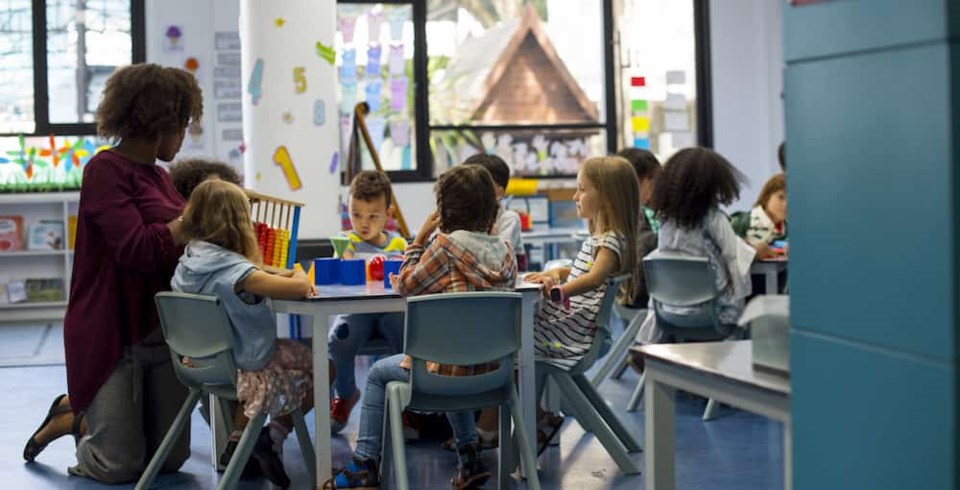Children under the age of five are amazing sponges for information. Ask any childhood researcher, or any parent who has told a story to another adult, only to have a child bring it up at an inopportune moment.
But that sponge-like nature, if encouraged and nurtured, means a child has the opportunity to grow into their best self, and have the tools and capabilities that will allow them to succeed in whichever way they see fit.
“We know that the child’s first experiences with language and culture come from within his own family, and within early childhood settings.” says Josée Latulippe, manager of Collège Boréal’s Centre d’innovation sociale pour l’enfant et la famille (CISEF – Child and family social innovation centre).
It is for this reason that the FrancoFUN program was created by the Association francophone à l’éducation des services à l’enfance de l’Ontario (AFÉSEO – Francophone association for early childhood education) as a way to ensure that early childhood educators are not just offered the chance to enhance early French-language learning for children, but to ensure that they can view their classroom through the Francophone lens, and build identity as well as skill set.
“Identity building is vital, “Latulippe said. “Because studies show that it is a key mechanism to ensure the vitality of minority-language communities and prepare young children to be educated in French when they enter elementary school.”
And it is this “continuum of language,” as Latulippe calls it, that ensures language and cultural identity survives. As children here in Sudbury, both Anglophone and Francophone, have the ability to enjoy their education in French from childhood to post-secondary, it ensures that a culture and language that could be considered already marginalized is one that will last the test of time, regardless of the surrounding majority.
The FrancoFUN program focused not just on providing language to students, but also the cultural identity behind the Franco-Ontarien legacy. It is a specific culture, with a specific dialect — headed to ‘camp’ anyone — and stories and history all its own. And it is one that, if shared, can enrich a child’s ability to learn a language, and bring together a community that is consistently working to preserve its cultural identity.
And now that the FrancoFUN program has been in place for some time, helping Early Childhood Educators find ways to continually incorporate cultural, historical, language-based, and just plain fun aspects of the Franco-Ontarien peoples, they are now ready to measure the success, and share their methods with others.
“We are always reflecting,” said Latulippe, and notes the questions they continually ask: “How can I better my program? How can I make it more accessible? Do we have a welcoming structure in place to welcome families that are French and English?”
For it is not just fully Francophone families that can benefit from this type of study, and action. If you would like your child to speak French, but your home is mixed-language, or perhaps somewhat disconnected to the culture, then this type of programming will not only offer you the opportunity to increase your child’s chances of success, as Latulippe notes that research shows language learning is greatly helped by immersion into the culture of the language, not just the words.
And this is especially true for parents who would like their children to speak French, but do not do so themselves. Simply by building a bridge between your home and the school, said Latulippe, you can enrich your child’s language learning without knowing a word yourself. With a program like FrancoFUN, you can learn about the culture as well.
“It doesn’t mean you need to take French classes,” Latulippe said. “You just need to support the culture in your home. It’s because we are all the first educators.”
And now, as the program has raised awareness among early childhood educators about their role in encouraging Francophone identity in their classrooms, it’s time to find out how the tools are working. From now until March of 2021, a survey of the educators and their thoughts and feeling about the program will be gathered, and shared amongst interested parties.
“We are hoping we will have a tool to promote culture and language identity within Early Childhood settings,” said Latulippe, “which can then be shared within the community, with teachers at the college, and with the Franco-Ontarien culture really.”
And it is this tool that Latulippe hopes will encourage not just French-language learning across Ontario, but also an understanding of the unique and beautiful qualities that make a culture, and a portrait of those who have come before, and those who will come after.
Because the loss of any culture is a horrific idea; but the loss of folklore, of La Nuit sur l'étang, of ‘Notre Place’, of CANO, and of tourtière and tarte au sucre, is much too tragic to imagine.
Jenny Lamothe is a Local Journalism Reporter at Sudbury.com, covering issues in the Black, immigrant and Francophone communities. She is also a freelance writer and voice actor. Contact her through her website, JennyLamothe.com.
